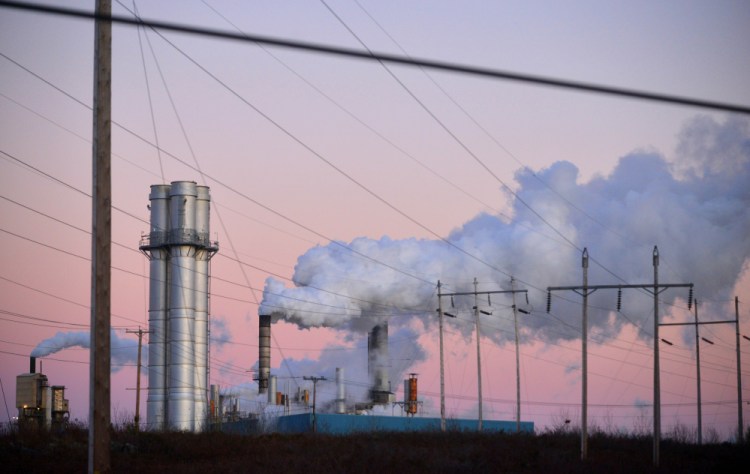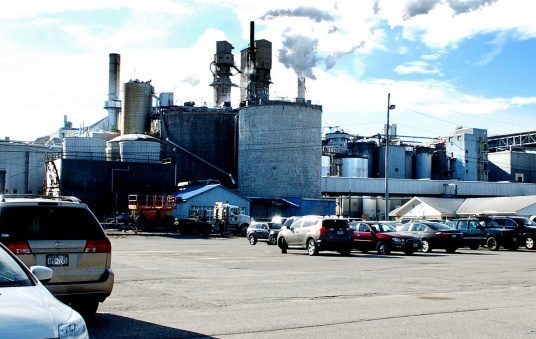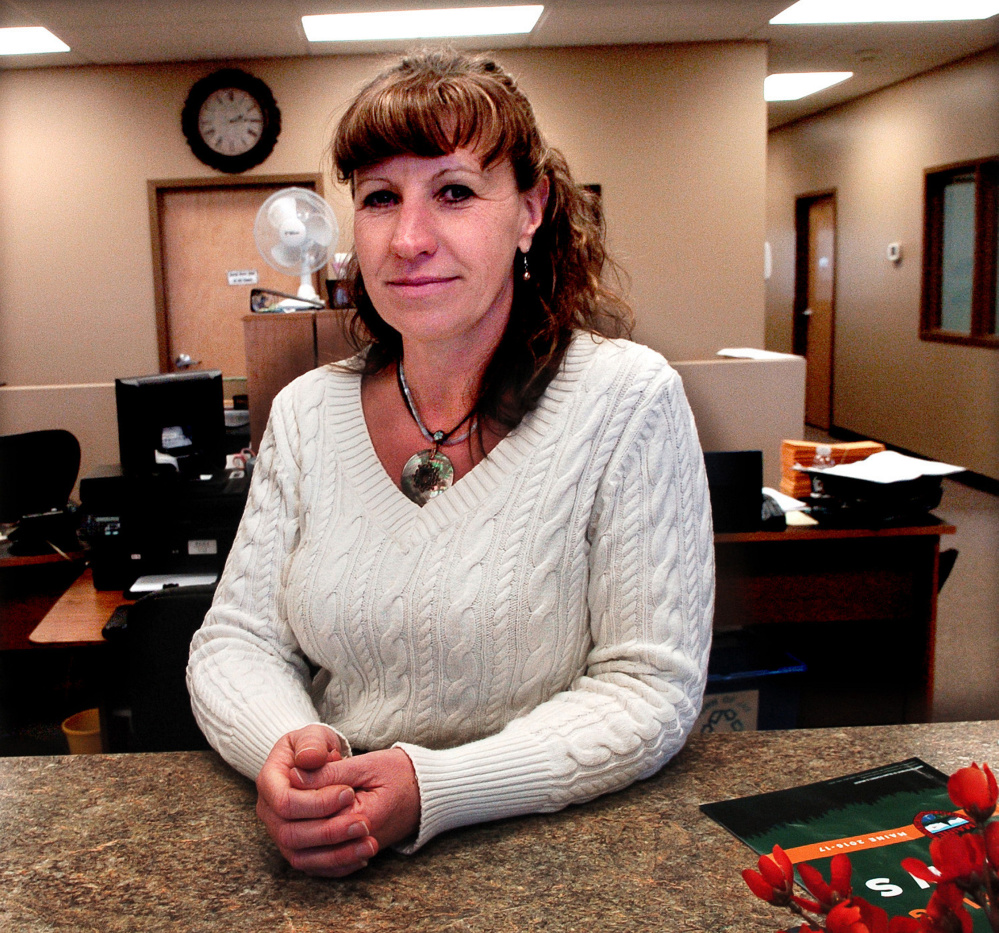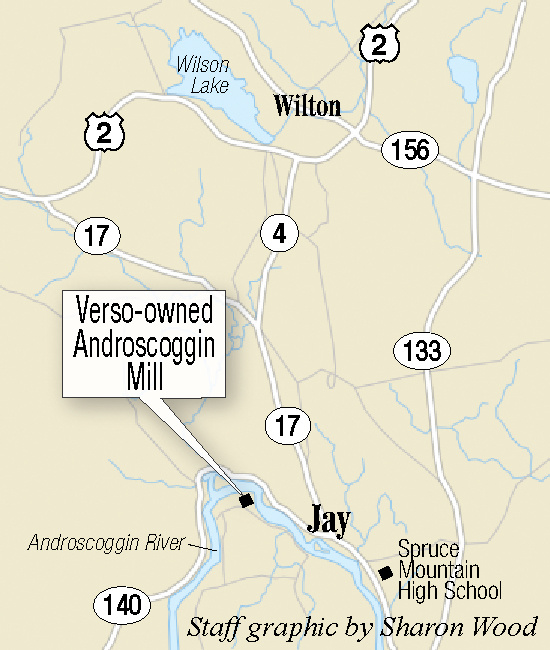Verso Corp. announced Wednesday that it would shut down the No. 3 paper machine permanently at its Androscoggin mill in Jay, resulting in the elimination of 120 jobs there — nearly a quarter of the workforce.
The company had said in November it would idle the key papermaking machine temporarily because of declining customer demand and “more coated paper capacity than could be filled.”
In a filing Wednesday with the Securities and Exchange Commission, Verso says the shutdown would be effective Aug. 1 and is expected to be complete by the end of the third quarter of 2017. The shutdown would reduce the mill’s annual coated paper production capacity by about 200,000 tons.
Jay Town Manager Shiloh LaFreniere said the town had heard the company was exploring options to bring the No. 3 machine and its associated equipment back online, and it was expecting an announcement.
“We were hoping it was going to go the other way,” LaFreniere said in an interview Wednesday. “We’re ready for some good news.”
Verso’s struggles are part of an ever-growing string of closures and layoffs that have plagued Maine’s paper industry in recent years. Five mills have closed in the last few years — including Verso’s closure of its Bucksport mill in 2014, with more than 500 lost jobs; and the Madison Paper mill closure in May 2016, which put more than 200 people out of work. More than 2,300 Maine workers have lost their jobs since 2011 as the industry reels from declining global demand for paper.
The Androscoggin mill laid off 300 employees in 2015 as part of a plan to reduce production capacity. Verso then emerged from bankruptcy in the summer of 2016 and had about 560 employees at the time. In its initial announcement in November, the company said it expected to lay off around 190 workers, but some have since chosen to leave the company for retirement or in search of more stable job options.
This latest round of layoffs will reduce the company’s workforce further, from 520 employees to 400. Of the employees informed of the layoffs in November, 120 have been on layoff status since January. They do not receive pay but continue to be eligible for Verso health insurance benefits, according to Kathi Rowzie, vice president of communications and public affairs at Verso.
As of Aug. 1, those employees will lose their employer coverage and be eligible for COBRA gap coverage. Employees who are losing their jobs because of the shutdown will receive severance pay, the company said.
Most of the products made on the No. 3 paper machine have since been transitioned to lower-cost machines at other Verso mills, the company said.
“While permanently closing this capacity is the right strategic decision for Verso as a whole, we are mindful of the effects this action will have on the people at the Androscoggin Mill who are directly affected, and we are committed to treating them with fairness, dignity and respect during this difficult time,” Verso Chief Executive Officer B. Christopher DiSantis said in a statement Wednesday. “On behalf of the entire Verso team, I want to express our sincere thanks and appreciation to them for their dedicated service and many contributions to the mill and to our company.”
In its filing with the SEC, the company said severance and benefits payouts related to the shutdown amount to about $4 million, plus another $1 million in writing off spare parts and inventory produced on the No. 3 paper machine in 2016.
LaFreniere said she has not received any additional details on why Verso made the decision to shut down the No. 3 machine permanently.
She said the mill’s decline had taken a significant financial toll on the town, leading to town and school budget cuts. In 2016, the town raised its property tax rate from $17.25 to $21.10 to try to make up some of its lost revenue from the mill’s declining value.
The company’s announcement in November sent shock waves through the town of about 5,000 people, highlighting yet another struggling Maine mill on the edge with hundreds of jobs on the line.
The loss of the No. 3 machine has since been felt down the supply chain. When Verso initially announced its plan to idle the machine, the Professional Logging Contractors of Maine predicted the closure would result in a loss of half a million tons of fiber. In the months since the announcement, Dana Doran, executive director of the logging group, said those predictions largely have turned out to be true.
“When you remove that from harvesting and trucking, clearly you don’t need as many people to do those tasks, so there’s a systemic change that takes place because the entire value chain is disrupted,” Doran said. “We hoped they could make some systemic changes and find a new market and restart that machine based upon new potential sales, but it doesn’t look like they were able to do that, which is unfortunate.”
However, the news coming out of Verso and Maine’s remaining paper mills might not be all bad. Verso will continue to operate two paper machines, one for coated paper and the other for specialty paper, as it works to position the Androscoggin Mill as a specialty paper mill.
“Unlike the coated paper market, the specialty paper market continues to grow,” Rowzie said.
DiSantis said in his statement Wednesday that the company “is leaving no stone unturned in our efforts to move the company toward sustained profitability in a market where customer demand for our graphic paper products continues to decline.”
He added, “Although the footprint of the Androscoggin Mill is getting smaller, we continue to take steps to position the facility as a leading producer for the growing specialty papers market.”
Several of Maine’s paper mills have turned to the specialty paper market in their search for new revenue. Doran thinks the mills should be commended for their continued efforts and investment.
“They clearly are looking for new markets and investing in it and we are very supportive of anything they can do,” Doran said. “There’s a lot going on right now to try to right this ship.”
But the specialty paper market comes with its own challenges. It is more fractured and requires investments in type-specific technologies.
Lloyd Irland, a consultant and longtime observer of the Maine forest industry, does not follow the specialty market closely, but on Wednesday he cautioned against overly definitive forecasts about the future of Maine’s paper industry.
“All of us who are supposed to be so smart about this business, we didn’t foresee how quickly those markets would collapse,” Irland said.
Kate McCormick — 861-9218
kmccormick@centralmaine.com
Twitter: @KateRMcCormick
Send questions/comments to the editors.







Success. Please wait for the page to reload. If the page does not reload within 5 seconds, please refresh the page.
Enter your email and password to access comments.
Hi, to comment on stories you must . This profile is in addition to your subscription and website login.
Already have a commenting profile? .
Invalid username/password.
Please check your email to confirm and complete your registration.
Only subscribers are eligible to post comments. Please subscribe or login first for digital access. Here’s why.
Use the form below to reset your password. When you've submitted your account email, we will send an email with a reset code.